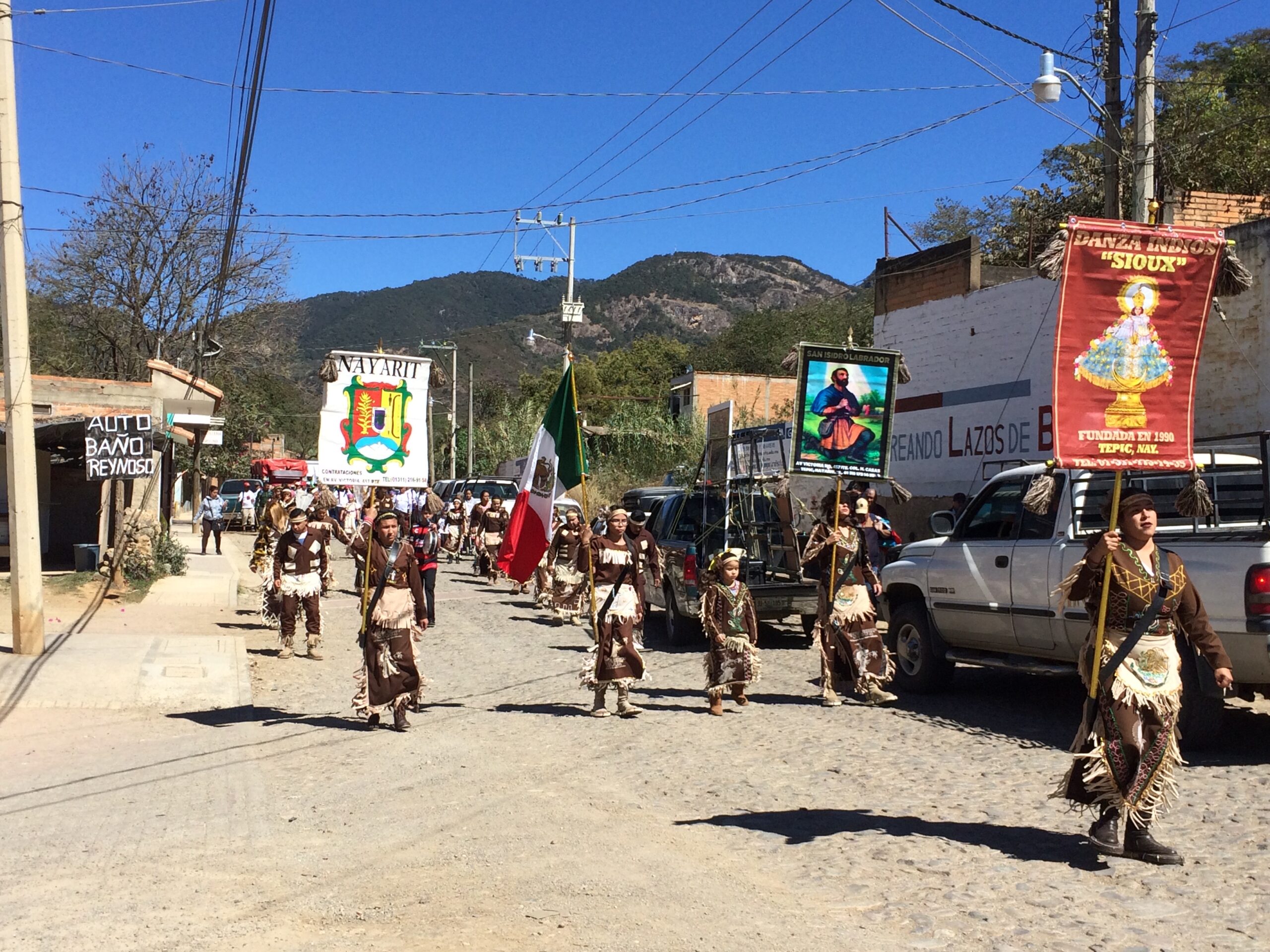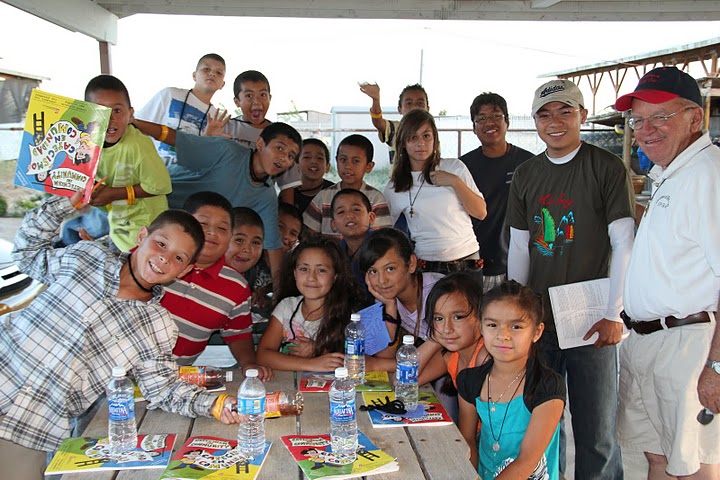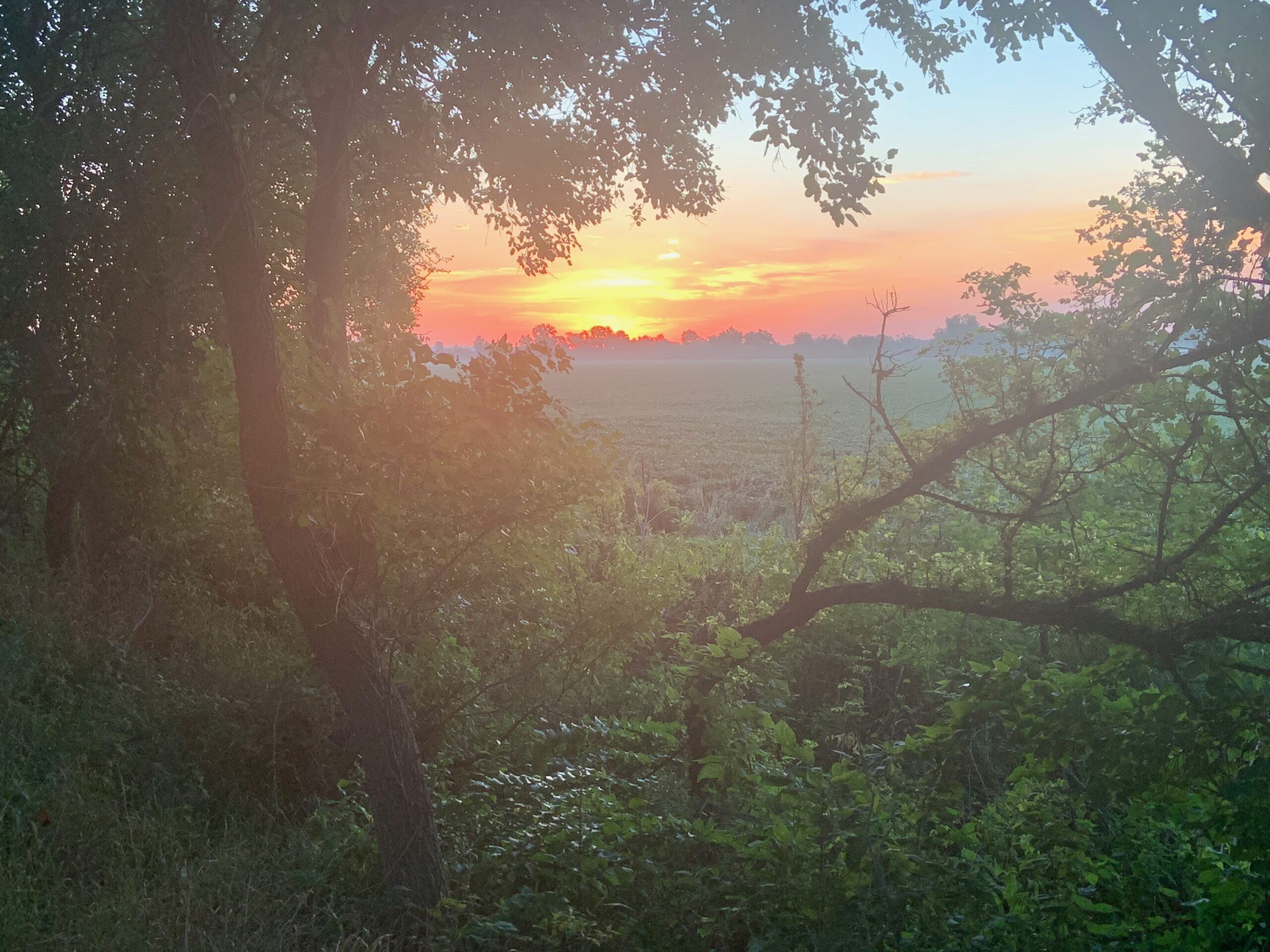Lighten the Burden / Aligera la Carga
La foto arriba es de matachines, entrando un santuario en México.
Hace dos días, presenté el tema: “Aligera la carga”. Desde el primer día de ofrecer la misa en español, me di cuenta de que estoy trabajando con personas de una cultura católica que llega directamente al corazón de las personas que caminan con Jesús, María y los santos. La Misa fue el Día de la Independencia de México y terminamos la Misa con varios “gritos”. El último fue, “Que viva la Virgen”. Pensé, “¿quién ama a la Virgen?” La respuesta, católicos. Aprendí en esa comunidad, ser mexicano iba ser católico. La fe es esencial en la comunidad hispana de migrantes e inmigrantes.
Experimento alegría y orgullo por el catolicismo entre muchos de los migrantes e inmigrantes que conozco, pero más y más hay personas que no encuentran un hogar dentro de nuestras comunidades católicas en los Estados Unidos. Puede haber muchas razones para eso, pero mi tristeza surge al ver a los migrantes humildes y pobres que luchan por sobrevivir en una sociedad que ha sido dura y poco acogedora para los más desfavorecidos entre nosotros. Incluso dentro de nuestras iglesias se mantienen al margen de la comunidad. Quiero decirles a los sacerdotes, religiosos, catequistas, voluntarios en nuestras comunidades eclesiales, “Aligera la carga” para nuestros migrantes. Lo siguiente proviene del capítulo ocho de mi libro, La Fe del Migrante. Comienza una reflexión sobre la acogida de los pobres a los sacramentos de la Iglesia.
The picture above is of matachines dancers on pilgrimage to a Marian shrine in Mexico.
A couple days ago, I introduced the theme: “Lighten the Burden.” From the very first day saying Mass in Spanish, I realized that I am working with people from a culture of Catholicism that goes right to the heart of people walking with Jesus, Mary and the saints. The Mass was on Mexican Independence Day and we ended the Mass with several “gritos” (cheers), but the last was “Que viva la Virgen.” I thought, “who loves the Virgin Mary?” The answer, Catholics. I learned in that community, to be Mexican meant to be Catholic. Faith is essential in the migrant, immigrant Hispanic community.
While I experience joy and pride in Catholicism amongst many of the migrants and immigrants that I meet, there are more and more people not finding a home within our Catholic communities in the United States. There may be many reasons for that, but my sadness comes in seeing humble, poor migrants struggling to survive in a society that has been harsh and unwelcoming to the most underprivileged among us. Even within our churches they are kept on the fringes of the community. I want to tell priests, religious, catechists, volunteers in our church communities, “Lighten the Burden” for our migrants. The following comes from chapter eight of my book, Migrant Faith. It begins a reflection on welcoming the poor to the sacraments of the Church.
Aligera la Carga
Los migrantes que desean que un niño o niña reciba el Bautismo, la Confirmación, o la Primera Comunión encuentran reglas en la Iglesia en los Estados Unidos confusas e inconsistentes. Un trabajador migrante dijo: “Las reglas de la Iglesia aquí forman barreras que separan a los migrantes de la gracia de los sacramentos”.
Por diez años yo he escuchado de que las familias migrantes experimentan una asombrosa variedad de dificultades al intentar inscribir a sus hijos en programas de formación religiosa. Un administrador de una parroquia dijo: “¿Qué quieren? ¿Calidad o cantidad?” En esa parroquia los programas eran de dos años para la Primera Comunión y dos años para la Confirmación. Además, tenían reglas rígidas de asistencia que eran imposibles de cumplir en el contexto del trabajo agrícola del migrante. Desafortunadamente, estas reglas causan grandes apuros para los trabajadores migrantes. Muchas familias migrantes sienten que estos requisitos los castigan por su incapacidad de participar regularmente en las actividades de la Iglesia. Las reglas rígidas no proveen calidad cuando se excluye de estos programas a tanta gente pobre y trabajadora.
No es una opción entre calidad o cantidad, sino una cuestión de permitir que la gracia de los sacramentos esté disponible para el Pueblo de Dios. Nunca se debe permitir que las reglas del buen orden formen barreras para la participación de los católicos, especialmente de los pobres. No es buena catequesis abrumar al pobre con obligaciones excesivas. Las reglas se necesitan para el buen orden en la administración de los sacramentos, pero todas las reglas deben de ser lo suficientemente flexibles para satisfacer las necesidades pastorales de la gente que tiene poco control del tiempo disponible para rendir culto y participar en la iglesia. Para usar el tiempo, el espacio y el personal adecuadamente, las parroquias establecen programas para la preparación sacramental. Al establecer estos programas, las parroquias fijan expectativas que son demasiado difíciles para las familias migrantes. Los migrantes tienen poco control de sus horarios de trabajo y sus trabajos son temporales e inseguros. Tal parece que muchos programas están rígidamente administrados y se presta poca atención a aquellos que no pueden cumplir con todos los requisitos.
¿A quienes les proclamó Jesús el Reino de Dios?
El Obispo John Steinbock de la diócesis de Fresno se dirigió a este tema en su discurso en la convocación diocesana el 25 de enero de 2010:
Jesús se encontraba principalmente entre los pobres, los enfermos, los cojos, los afligidos, los oprimidos, los marginados, los leprosos, los cobradores de impuestos y los despreciados por la alta sociedad. A ellos especialmente Jesús les proclamaba el Reino y el amor de Dios. ¿Quiénes son estas personas en nuestra sociedad y en nuestras parroquias? Son los pobres, las familias desamparadas, los trabajadores agrícolas y sus familias, los migrantes, los indocumentados, los enfermos, los prisioneros. La gran mayoría de estas personas solo asisten a misa de vez en cuando.
Estas reflexiones hablan de los que viven en el margen de la Iglesia, en carros, en campos de trabajo, en grupos aislados de casas, y en granjas y lecherías a través de la diócesis sin el lujo del transporte y sin estabilidad en sus vidas. Debemos ayudar pastoralmente, especialmente a aquellos que Nuestro Señor ama de una manera especial. Para ellos es el Reino de Dios.
“Proclamando el Reino de Dios”
Obispo John T. Steinbock
Convocación Diocesana de Fresno, enero 2010
Esta carta pastoral del Obispo Steinbock al clérigo de la diócesis de Fresno capta la relación de la Iglesia con la gente marginada. Los trabajadores agrícolas son sólo un ejemplo de personas con necesidades extraordinarias. Manejadores de troques, enfermeras, artistas, trabajadores de restaurantes y hoteles y muchos otros trabajan largas horas los fines de semana. Para esta gente, es muy difícil asistir a la iglesia los domingos.
Situaciones que requieren flexibilidad para preparar a la gente para los sacramentos no son sólo un problema para los pobres, pero se puede cuestionar si los pobres reciben tanta consideración en circunstancias atenuantes como los demás en la sociedad. En mi primer puesto como sacerdote de 1974 a 1977, tuve el privilegio de preparar a tres jugadores de ligas menores de béisbol para el matrimonio. Eran unos buenos jóvenes, pero el viajar como beisbolistas hacía la preparación para el matrimonio muy difícil. La mayor parte de la preparación se llevó a cabo individualmente sin la presencia de ambos el hombre y la mujer. Nadie cuestionaría la atención individual necesaria para preparar a estos atletas para el matrimonio. Pero ¿consideramos darles atención individual a quienes trabajan en empleos temporales, lejos de sus familias y que tienen dificultad en asistir a los programas sacramentales en nuestras parroquias?
Es importante recordar que las reglas que hacemos son para la gente, toda la gente. Mientras más sea rígida la regla, más generosos debemos ser para otorgar excepciones. No se considera conveniente crear programas alternativos que atienden las necesidades de aquellos que tienen dificultad para participar en los programas ordinarios de la parroquia debido a sus horarios. Debemos desarrollar una actitud misionera que acoja a la gente a la presencia amorosa de Dios. Nuestras parroquias necesitan ser comunidades acogedoras para los creyentes migrantes.
(Voy a continuar esta reflexión. Que nosotros “Aligera la carga.”)
Lighten the Burden
Migrants find rules in the Church in the U.S. confusing and inconsistent when asking that their children receive the sacraments of initiation. One migrant worker said, “Las reglas de la Iglesia aquí forman barreras que separan a los migrantes de la gracia de los sacramentos.” (Church rules here form barriers that prevent migrants from receiving the grace of the sacraments.)
For ten years I have heard an amazing assortment of difficulties experienced by migrant families in getting their children into programs of religious formation. One parish administrator said, “What do you want? Quality or quantity?” People in that parish found the programs to be of long duration (two years for First Eucharist and two years for Confirmation) and having rigid attendance rules that were simply not possible in the context of migrant farm work. Unfortunately, these rules produce extreme hardships on migrant workers. Many migrant families see these requirements as punitive for their inability to participate regularly in church activities. Rigid rules do not provide “quality” when so many hard-working poor people are excluded from the programs.
The issue is not a choice between quality or quantity, but rather a question of making the grace of sacrament available to the people of God. Rules for good order can never be allowed to form barriers to the participation of Catholics, especially the poor. Placing heavy obligations on the poor is not good catechesis. Rules are necessary for good order in the administration of the sacraments, but all rules should be sufficiently flexible to meet the pastoral needs of people who have little control of the time they have available for worship and church participation. To best use time, space and personnel, parishes establish programs for sacramental preparation. As the parishes establish these programs they place expectations that are extremely difficult for migrants. Migrants have little control of their hours of work. Their jobs are temporary and insecure. Many programs are rigidly administered, and little is done for those unable to fulfill all the requirements.
To whom did Jesus proclaim the Kingdom of God?
Bishop John Steinbock of the diocese of Fresno spoke to these issues in his address to the diocesan convocation on Jan. 25, 2010:
Jesus was found mostly amongst the poor, the sick, the lame, the suffering, the oppressed, the marginalized, the leper, tax collectors, those looked down upon and despised by the upper class. It was to these especially that He proclaimed the Kingdom of God, and manifested God’s love. Who are these people in our present society, and those within our parishes? They are the poor, the homeless families, the farm workers and their families, the migrant, the undocumented, the sick, the imprisoned. The vast majority of these people rarely come to Mass.
These reflections are speaking of those that live on the margin of the Church, living in cars, in labor camps, in isolated clusters of homes, and those that work on the farms and dairies found throughout our diocese, so often without the luxury of transportation and of living a normal scheduled life. We should be pastoral, especially to those that our Lord loves in a special way. It is just such as these that the Kingdom of God is comprised.
“Proclaiming the Kingdom of God”
Bishop John T. Steinbock,
Fresno Diocesan Convocation, January 2010
This pastoral letter of Bishop Steinbock to the clergy of the diocese of Fresno captures the relationship of the Church to the people on the margins. The example of the needs of farm workers is just one example of people with extraordinary needs. Truckers, nurses, entertainers, restaurant and hotel employees and many others work long hours on weekends. For many such people, there is extreme hardship in trying to attend Sunday services.
Flexibility in preparing people for sacraments is not simply a problem for the poor. Do the poor get as much understanding of extenuating circumstances as others in society? In my first assignment as a priest from 1974-1977, I had the privilege of preparing three minor league baseball players for marriage. They were fine young men whose travel as baseball players made marriage preparation very inconvenient. It was difficult working around their schedules for travel, practice and games. Most of the preparation was done individually without the presence of both the man and the woman. No one would question the individual attention that was needed in preparing these athletes for marriage. Yet, do we consider giving individual attention to migrants that work temporary jobs and find it difficult to attend sacramental programs in our parishes?
It is important to remember that the more rigid the rule, the more generous we must be in granting exceptions to the rule. Creating alternative programs that address the needs of those whose schedules make it difficult to participate in the ordinary programs of a parish is not convenient, but we need to develop a missionary attitude that welcomes people into the loving presence of God. Our parishes need to be welcoming communities for migrant believers.
(I will continue this reflection for the next few days. Let us “Lighten the Burden”.)






